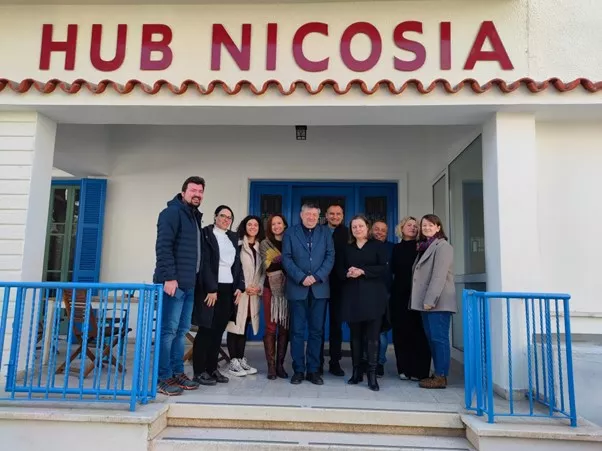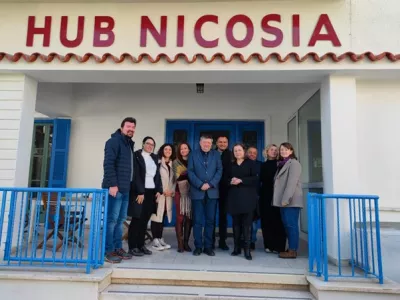Summary
The WE GREEN project developed skills for green jobs and entrepreneurship in rural areas, using digitalisation and the social economy model. The project was implemented in Slovenia, Cyprus, Romania and Serbia.
It consisted of a series of targeted actions, including two capacity-building programmes for more than 120 participants, a guide for stakeholders and an information package collecting 20 best practices related to green social entrepreneurship for women living in rural areas throughout Europe.
Results
- Capacity-building programme implemented in Slovenia, Romania, Cyprus and Serbia, targeted at educators, rural women and local communities, equipping a total of 40 people with new skills;
- Information package including: four national-level reports and one EU-level report that outline the specific needs of rural women and the challenges they face when trying to enter the workforce; and
20 good practices proposing tangible solutions for the integration of rural women in the labour market through green social entrepreneurship; - Online, user-friendly capacity-building programme for formal and non-formal educators, focusing on digital and green skills and featuring information materials. The programme benefited 85 people over the course of the project;
- Guide to support women's entrepreneurship in rural areas, based on policy recommendations for future replication and developed through focus groups with stakeholders in the policy-making process at the EU and national levels.
Resources
Documents
Context
Rural women migrate to urban areas at a higher rate than men to access higher-quality educational and employment opportunities, which are less available to them in rural labour markets due to structural deficiencies. This process hampers the economic and social development of rural areas.
Strategically linking opportunities within the European Green Deal and the EU’s Gender Equality Strategy 2020-2025 can improve gender equality in energy, climate and sustainability in rural areas, and support a sustainable recovery from the COVID-19 pandemic. Rural residents, especially women, need training and access to education and funding to contribute to greening of the rural economy in order to drive sustainable economic transformation and generate new jobs.
Objectives
-
Raise awareness in rural areas of women-led green entrepreneurship as a vehicle for the empowerment of local communities;
-
Build the capacities of formal and non-formal educators in rural areas on green social entrepreneurship for women;
-
Design and implement a local programme for empowering women in rural communities through green social entrepreneurship;
-
Develop guidelines for stakeholders at local, national and European levels for fostering women’s entrepreneurship in rural communities.
Activities, key actors, and timeline
The project carried out a series of research activities to design the tailor-made capacity-building programmes:
Desk research:
-
Conducted in two phases: initial background information gathering and validation through field research;
-
Objectives included understanding green social entrepreneurship among rural women, exploring training experiences, identifying needs and uncovering good practices;
-
Analysed national context, legal frameworks, existing research, policy documents, statistical data and good practices.
Field research:
-
Aimed to identify rural women's needs, challenges and good practices across participating countries;
-
Interviews with 20 educators focused on country-specific contexts, needs, training curricula and challenges;
-
Four focus group discussions explored support types, gender barriers, green entrepreneurship challenges and intervention programmes.
Focus groups at national and EU levels:
-
Addressed types of support, gender barriers, green entrepreneurship challenges, rural women’s empowerment, skills and competencies needed for green transition support;
-
Participants included rural women, project managers, training experts and university professors.
Best practices:
-
Selected two best practices from each participating country and 10 from the EU level;
-
Collected information on practice details, the green dimension, services/products, skills needed, trends and potential benefits and documented it in a final report.
Success factors/lessons learnt
The WE GREEN project took account of factors such as age, geographic location and existing skills gaps to address rural women’s diverse needs in the proposed capacity-building initiatives. This ensured inclusivity and relevance of the approach to rural women's empowerment.
The project addressed key challenges, such as unequal access to information and lack of awareness of available support, through strategic interventions, including the organisation of multiplier events and national training. These not only disseminated knowledge, but also fostered a sense of community and collaboration among participants, facilitating a peer-to-peer learning environment.
WE GREEN acknowledged territorial differences, tailoring interventions to the specific needs of more and less advanced rural areas. This flexibility enhances the project's potential for replication in diverse settings, showcasing its scalability and relevance across various contexts.
Key project findings include the need for ongoing support mechanisms, tailored approaches and the creation of a supportive ecosystem for women's entrepreneurship in rural areas. A collaborative approach – partnering with intermediary local organisations and engaging experienced trainers – enhanced the project's impact by leveraging existing networks and expertise, thus ensuring a more effective and widespread implementation of capacity-building initiatives.
Contacts
Anastasia Costantini, Diesis Network:
anastasia.costantini@diesis.coop

